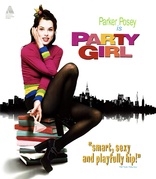Party Girl Blu-ray Movie
HomeParty Girl Blu-ray Movie 
Standard EditionFun City Editions | 1995 | 94 min | Rated R | Jul 11, 2023
Movie rating
7 | / 10 |
Blu-ray rating
| Users | 0.0 | |
| Reviewer | 4.0 | |
| Overall | 4.0 |
Overview
Party Girl (1995)
Mary is a free-spirited young woman with a run-down New York apartment and a high fashion wardrobe. She calls her godmother, a librarian, for bail money after being arrested for throwing an illegal party. To repay the loan, she begins working as a library clerk. At first she hates it, but when challenged decides to master the Dewey Decimal System and become a great library clerk, while romancing a falafel vendor and helping her roommate in his goal to become a professional DJ.
Starring: Parker Posey, Anthony DeSando, Guillermo Diaz, Donna Mitchell, Liev SchreiberDirector: Daisy von Scherler Mayer
| Comedy | 100% |
Specifications
Video
Video codec: MPEG-4 AVC
Video resolution: 1080p
Aspect ratio: 1.85:1
Original aspect ratio: 1.85:1
Audio
English: DTS-HD Master Audio 2.0 (48kHz, 24-bit)
Subtitles
English SDH
Discs
Blu-ray Disc
Single disc (1 BD)
Playback
Region A (B, C untested)
Review
Rating summary
| Movie | 3.0 | |
| Video | 4.5 | |
| Audio | 3.0 | |
| Extras | 4.5 | |
| Overall | 4.0 |
Party Girl Blu-ray Movie Review
Reviewed by Brian Orndorf June 6, 20231995’s “Party Girl” wasn’t a box office success, but it managed to slip into “cool film” territory, making its debut at the Sundance Film Festival and raising the profile of star Parker Posey, who was in the midst of creating an acting career for herself. Co-writers Harry Birckmayer and Daisy von Scherler Mayer (who also directs) endeavor to use the actress’s singular screen energy to power a look at a twentysomething character in New York City confronted with the waywardness of her life, creating a dramedy that awkwardly goes from slight wackiness to insignificant heart. “Party Girl” gets by with its NYC energy and club music soundtrack, providing a vivid snapshot of the scene as it was in the mid-90s, but it’s not a terribly compelling character study, with the writing often unsure how seriously to take the main character and her seemingly insincere ways.
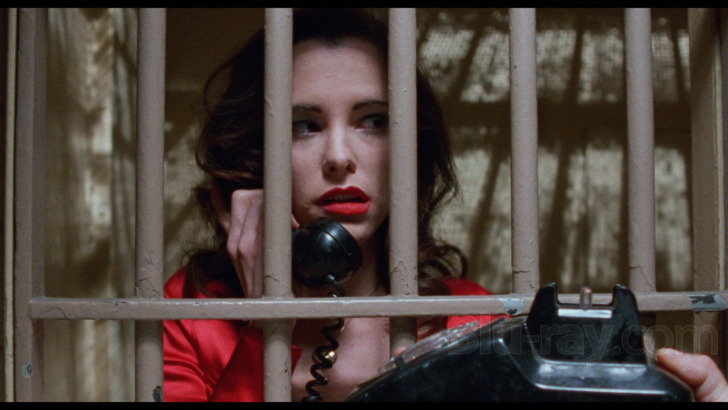
Mary (Parker Posey) is a New Yorker who lives to avoid responsibility. When her latest effort to throw a party is broken up by the police, Mary is forced to turn to her godmother, librarian Judy (Sasha von Scherler), for monetary help, pulled into employment at a local library, where she learns the clerking life. Introduced to the order of the Dewey Decimal System, Mary begins to develop an appreciation for organization, and she has her eye on Mustafa (Omar Townsend), a Lebanese food vendor who isn’t sure how to deal with the woman’s crazy energy. While pal Leo (Guillermo Diaz) hopes to become a major D.J. on the scene, looking to impress caustic club owner Rene (Donna Mitchell), Mary tries to battle her love of mischief, dealing with a chaotic life she’s unable to manage anymore.
Mary is stuck in a cycle of irresponsibility, living for parties and friends, but barely paying attention to financial needs and maturity. She’s a child trying to survive in an adult world, relying on social functions to deny reality, also handling a crude boyfriend in Nigel (Liev Schreiber) and demands from Leo, who’s trying to become a hot D.J. while facing major competition for work. “Party Girl” does a fine job identifying the crisis Mary struggles with, but it doesn’t always know what to do with it, finding real inspiration with the library side of the story, as Judy hopes to smack some sense into her recalcitrant goddaughter by giving her a job. Watching Mary deal with this routine and education delivers a best stretches of the film, as Mary is confronted with the menacing ways of the Dewey Decimal System and all the order it contains, which is an alien experience for a woman who usually spends her days stealing clothes, dancing, and trying to get tortured street vendor Mustafa to look her way.
“Party Girl” perks up when it deals with New York City navigation, as von Scherler Mayer hopes to capture the life of the city and the liveliness of the club scene, using a thumpy soundtrack to sell an atmosphere of celebration and pageantry. Street life is memorable as well, with the production finding a slightly different side of NYC, sending Mary to streets, clubs, and the library as she displays her special style, aiming to become a figure of royalty while dealing with the messiness of her friends and lovers. “Party Girl” is certainly fun to watch, with von Scherler Mayer generating an evocative atmosphere of urban survival.
Party Girl Blu-ray Movie, Video Quality 
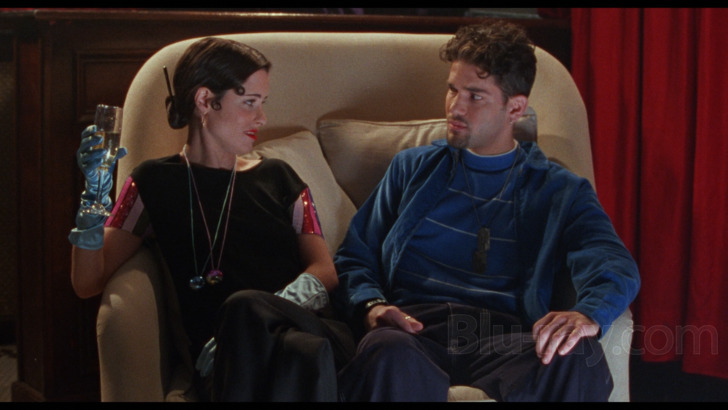
The AVC encoded image (1.85:1 aspect ratio) presentation for "Party Girl" is listed as a "New 4K restoration from its 16mm original camera negative." There's a film-like viewing experience for fans of the feature, which retains capably resolved grain. Detail reaches about as far as possible, providing a sense of interior spaces and character gatherings, with costuming reasonably textured. Skin particulars are present. Exteriors keep their intended dimension, doing well with city tours. Colors are respectfully refreshed, with primaries inviting, offered on clothing choices and interior decoration. Signage is also vivid. Skin tones are natural. Delineation is satisfactory. Source is in good condition, with a few brief blips of damage.
Party Girl Blu-ray Movie, Audio Quality 
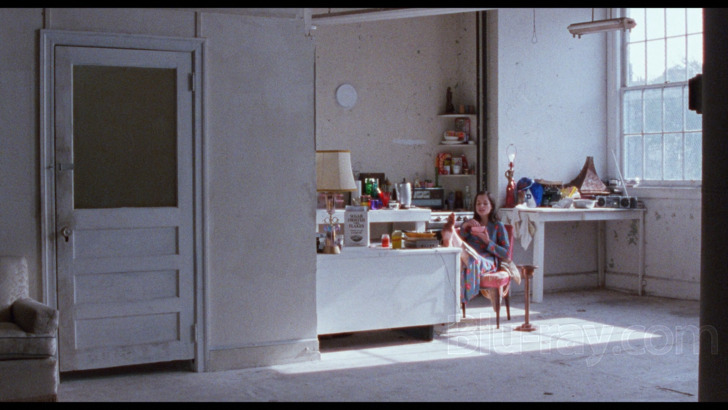
The 2.0 DTS-HD MA mix appears to be working with the inherent limitations of production sound. It's a slightly muddier listening experience for "Party Girl," which is mostly intelligible, but a few moments teeter on the edge of being lost. Some mild sibilance issues are present as well. Music isn't crisp, also maintaining a muted presence, lacking sharp instrumentation and defined beats.
Party Girl Blu-ray Movie, Special Features and Extras 
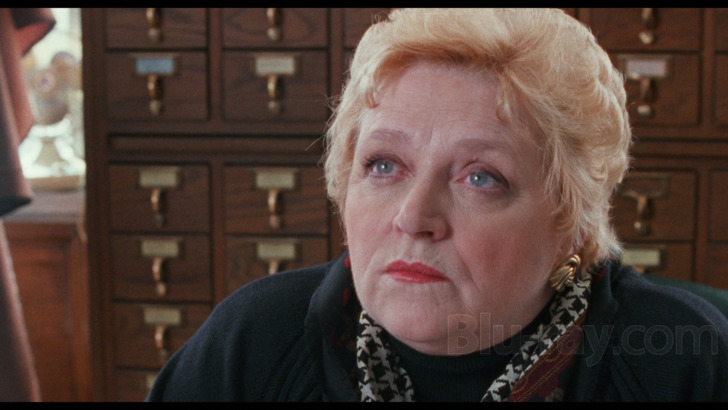
- Booklet (10 pages) contains an essay by Margaret Barton-Fumo, storyboards, and production photos and information.
- Commentary features writer Jake Fogelnest.
- "Designing a Character" (35:49, HD) is an interview with co-writer/director Daisy von Scherler Mayer, who details her formative years in New York City, raised in an entertainment business family, developing an interest in theatrical direction. Film ultimately captured her attention, making plans to create "Party Girl," which was influenced by screwball comedies and the rise of indie productions from NYC. Creative intent for the screenplay is explored, hunting to subvert cliché and deal with feminist ideas, paying attention to character. Rejected by the Hollywood system, von Scherler Mayer was left to find surprises in casting, including the hiring of Parker Posey and her own mother, Sasha. NYC locations are highlighted, with the helmer trying to offer a real take on city life. Other production achievements are explored, including costume design and soundtrack selections, and the release of "Party Girl" is tracked, becoming the first feature streamed on the internet, apparently beating "Hackers" to the punch.
- "Like an Old Movie" (24:22, HD) is an interview with actress Parker Posey, who responded to the screwball comedy intent of "Party Girl," ready to do something special with the unusual tone of the 1995 endeavor. Posey goes into the details of preparation and character, working to find the truth for a twentysomething in this unusual situation of work and play. Co-stars are fondly recalled, building a friendship with Liev Schreiber, soon reuniting on "The Daytrippers." Club life is identified, with the interviewee venturing into nightlife around the city, and she celebrates the librarian angle of the story, aiming to showcase these lives in the movie. The cult longevity of "Party Girl" is highlighted, celebrating the style, soundtrack, and optimism of the picture.
- "Power to the Librarians" (18:15, HD) is an interview with producer/co-writer Harry Birckmayer, who was pulled into the world of film in college, learning more about art and history, changing his life. Meeting Daisy von Scherler Mayer, a plan for "Party Girl" was formed, with the pair working on the screenplay for a long time, injecting their inspirations into the material. Familial influences on the writing are identified, along with a love for the library system. Birckmayer's own club experiences also factored into the screenplay. Casting is celebrated, connecting with Parker Posey, who brought her own spirit to the part. Other creative achievements are noted, including music, costuming, and locations.
- "DJ'ing to Picture" (16:02, HD) is an interview with musician Bill Coleman, who shares the creative drive behind the sounds of "Party Girl," building the soundtrack. Formative years and career ascent are tracked, with Coleman handling journalism demands and band management (including his discovery of Deee-Lite), eventually finding his way to Daisy von Scherler Mayer and Harry Birckmayer.
- Image Gallery (4:45) collects production communication, BTS snaps, cast headshots, rejection letters, and storyboards.
- And a reconstructed Theatrical Trailer (1:57, HD) is included.
Party Girl Blu-ray Movie, Overall Score and Recommendation 
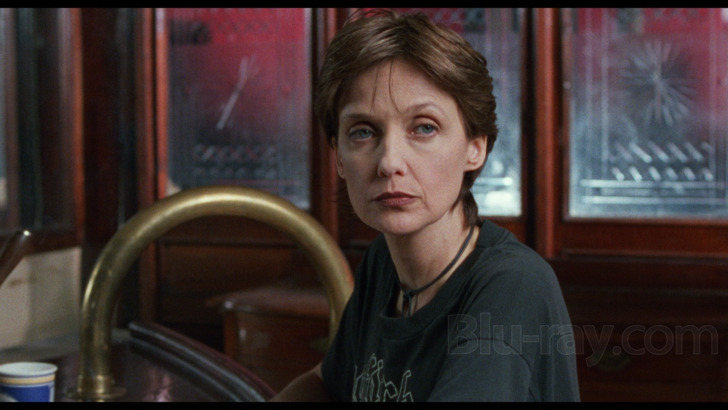
In the Blu-ray supplements Birckmayer and von Scherler Mayer routinely refer to "Party Girl" as their tribute to screwball comedies, but it's hard to appreciate this fandom while watching the movie. There's a sense of humor to Mary's daily misadventures, but the material isn't interested in jokes, and there's a defined dramatic side to the writing as well, with Judy an understandably exasperated woman, fed up with her goddaughter's ways. Mary is actually an unlikable character, casually destructive and somewhat mean, and the picture asks viewers to fall in love with her, to root for her journey into library science and her relationships. Such passion for the partier is a big ask from the limp screenplay, and Parker's never been great when it comes to communicating character sincerity, keeping Mary slightly predatory throughout the feature. "Party Girl" has a cultural fingerprint that's interesting, but von Scherler Mayer struggles to make it all meaningful, better off with fluffiness.
Similar titles
Similar titles you might also like

Speedy
1928

Monkey Business
1931

Shiva Baby
2020

Greener Grass
2019

Our Hospitality
Remastered
1923

Bananas
1971

Lost in America
1985

The Hoodlum
1919

Sleeper
The Woody Allen Collection
1973

Armageddon Time
2022

College
1927

Down on the Farm
1920

The Extra Girl
1923

Skinner's Dress Suit
1926

The Telephone Book
1971

The Mad Adventures of Rabbi Jacob
Les aventures de Rabbi Jacob
1973

Buster Keaton: The Shorts Collection 1917-1923
1917-1923

Grey Gardens
1975

Every Day's a Holiday
1937

The Saphead
Ultimate Edition
1920
